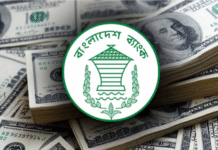
Highlight:
- US proposal lacks standard legal language found in bilateral trade deals
- US proposes that Bangladesh adopt US-imposed sanctions, tariff increases on third countries
- Dhaka objects legally adopting another nation’s domestic laws for international trade practices
- US also wants Bangladesh to not offer lower tariffs to any other country for products granted concessions to US
As the deadline for a reciprocal trade agreement approaches, Bangladesh and the United States remain divided over key terms, with Dhaka rejecting provisions it argues contravene international trade rules while pledging to continue negotiations.
The disagreement was laid bare during a high-level meeting in Washington on 26 June, where Bangladesh, represented by interim National Security Adviser Khalilur Rahman, presented counter-proposals in response to the draft agreement floated by the United States Trade Representative (USTR).
According to sources, the USTR rejected Bangladesh’s proposals.
Dhaka has since requested a detailed list of US products that would receive duty-free access under the agreement and plans to demand similar benefits for Bangladeshi exports. The US has yet to share the requested tariff schedule.
Commerce Secretary Mahbubur Rahman declined to comment on the specifics but confirmed negotiations were ongoing.
“We are very much on track. If the US seeks concessions from us, we’ll ask for the same. We’ll keep negotiating until the end to reach a solution,” he told The Business Standard yesterday.
A follow-up meeting is scheduled for 3 July. Commerce Adviser Sk Bashiruddin Ahmed is expected to join Khalilur Rahman in Washington, where discussions on the agreement’s tariff schedules and terms will continue.
In a recent interview with Fox News, US President Donald Trump said reciprocal tariffs would take effect from 9 July, with countries soon receiving formal notices detailing the specific rates.
Bangladesh is facing a 37% tariff under the proposed framework.
Dhaka’s key objections
Sources familiar with the negotiations said the US proposal lacks standard legal language typically found in bilateral trade agreements.
This omission is a major reason why no country has signed such a deal with the US over the past three months, they said.
The proposal includes clauses that would compel Bangladesh to adopt US-imposed sanctions and tariff increases on third countries.
Dhaka has expressed objections, saying it cannot legally adopt another nation’s domestic laws as binding for its international trade practices.
Another contentious clause prevents Bangladesh from offering lower tariffs to any other country for products already granted concessions to the US.
Officials argue this breaches the World Trade Organization’s Most-Favoured Nation principle, which requires equal treatment for all trading partners.
A senior policymaker, requesting anonymity, said, “If US buyers are willing to pay double for a product worth Tk100, we can certainly export. But even if exports suffer, we must not strike a deal by selling our dignity.”
No rivals ahead yet
Officials say Bangladesh has reason to believe the US is unlikely to finalise a reciprocal tariff deal with any country before the 9 July deadline.
An Indian delegation is currently negotiating in Washington but has not reached a settlement, despite India’s experience in signing trade pacts with 27 nations.
Trump has already imposed a 27% reciprocal tariff on India. However, officials noted that India is not a direct rival in the US apparel market, as it exports more textiles and fabrics, while Bangladesh focuses on ready-made garments.
Vietnam has also made limited progress. Accepting the US clause restricting tariff concessions may be particularly difficult for Hanoi, given its free trade agreement with the European Union.
According to officials, Bangladesh’s primary concern is ensuring it does not face higher tariffs than its competitors. As no breakthroughs have been reported in US negotiations with Vietnam or China, Dhaka is finding some relief.
Currently, the average US tariff stands at 37% for Bangladeshi goods, 46% for Vietnamese products, and even higher for Chinese exports.
If Trump’s reciprocal model is uniformly applied, policymakers believe Bangladesh will not be at a competitive disadvantage.









